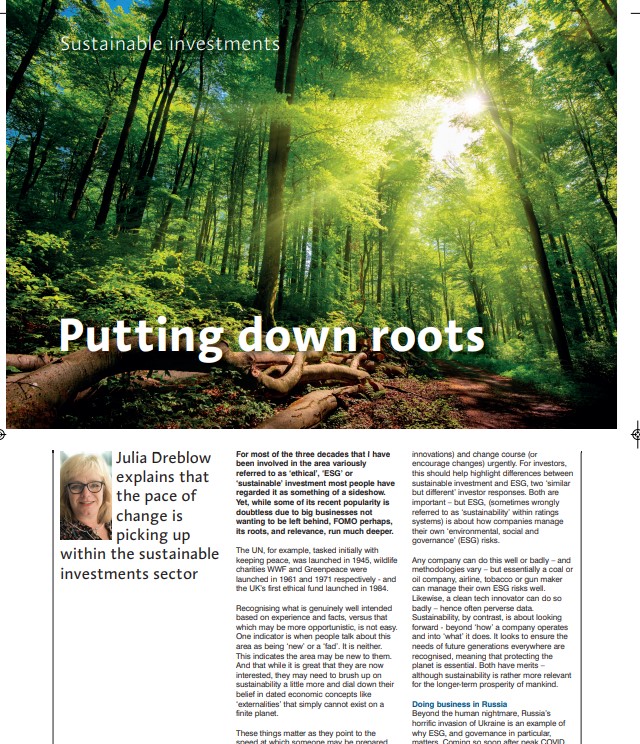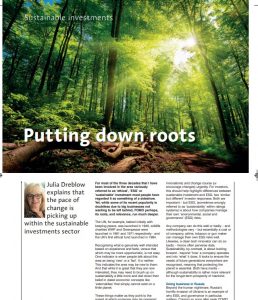ILP Moneyfacts – Sustainability slow, slow, quick
Posted on: July 18th, 2022

 Below is a link to an article that I wrote for this month’s Investment Life and Pension Moneyfacts. (Just published – July 2022)
Below is a link to an article that I wrote for this month’s Investment Life and Pension Moneyfacts. (Just published – July 2022)
My title for the piece was “Sustainable investment: slow, slow, quick” in recognition of the accelerating pace of change in all things sustainable investment, particularly climate change.
Their title ‘Putting down roots’ conveys much the same message – as the area is clearly far more established than it once was.
The text offers some thoughts on:
- the difference between ESG and sustainable investment
- the (climate related) parallels and lessons to be learned from our failure to respond adequately to Russia’s threats
- the quickening pace of climate and sustainability threats – asking who is driving up oil company share prices?
- dealing with ‘laggards within’ – and HSBC’s ‘Kirkgate’
- helping intermediaries to check the difference between words and action
- … & why investors must look forward not back.
You can download their smartened up version of the article or my cut and pasted original text below.
My thanks once again to the Moneyfacts team for inviting me to contribute!
ILP Moneyfacts – for 20 June 2022
Download article pdf here:
p10-11 Investment Life and Pension Moneyfacts – Sustainable investment: slow slow quick
Original text:
Sustainability: slow, slow, quick
For most of the three decades that I have been involved in the area variously referred to as ‘ethical’, ‘ESG’ or ‘sustainable’ investment most people have regarded it as something of a side show.
Yet, whilst some of its recent popularity is doubtless big businesses not wanting to be left behind, FOMO perhaps, its roots – and relevance – run much deeper. The UN, for example, tasked initially with keeping peace, was launched in 1945, wildlife charities WWF and Greenpeace were launched in 1961 and 1971 respectively – and the UKs first ethical fund launched in 1984.
Recognising what is genuinely well intended based on experience and facts, versus that which may be more opportunistic, is not easy. One indicator is when people talk about this area as being ‘new’ or a ‘fad’. It is neither.
This indicates the area may be new to them. And that whilst it is great that they are now interested – they may need to brush up on sustainability a little more and dial down their belief in dated economic concepts like ‘externalities’ – that simply cannot exist on a finite planet.
These things matter as they point to the speed at which someone may be prepared to move.
So as we approach what science tells us are a series of tipping points, beyond which the planet will no longer function as before, it is incumbent on business – and investors – to innovate (or support innovations) and change course (or encourage changes) urgently.
For investors, this should help highlight differences between sustainable investment and ESG, two ‘similar but different’ investor responses.
Both are important – but ESG, (sometimes wrongly referred to as ‘sustainability’ within ratings systems) is about how companies manage their own ‘environmental, social and governance’ (ESG) risks.
Any company can do this well or badly – and methodologies vary – but essentially a coal or oil company, airline, tobacco or gun maker can manage their own ESG risks well. Likewise, a clean tech innovator can do so badly – hence often perverse data.
Sustainability, by contrast, is about looking forward – beyond ‘how’ a company operates and into ‘what’ it does. It looks to ensure the needs of future generations everywhere are recognised – meaning that protecting the planet is essential.
Both have merits – although sustainability is rather more relevant for the longer-term prosperity of mankind.
Doing business in Russia
Beyond the human nightmare, Russia’s horrific invasion of Ukraine is an example of why ESG, and governance in particular, matters.
Coming so soon after peak covid, Russia’s actions have exacerbated supply chain pressures, contributed to the ever-growing cost-of-living crisis – and led to investment losses.
The long-term nature of the growing threat posed by Russia are expertly described in former star fund manager – now human rights activist – Bill Browder’s 2016 book ‘Red Notice: A True Story of Corruption, Murder and One Man’s Fight for Justice’.
His account of the toxic cocktail that can result from large amounts of money being stirred into an autocratic and corrupt regime – with little regard for its people – makes chilling reading. His heroic efforts to right wrongs resulted in the USA’s 2012 Magnitsky Act (now widely adopted internationally).
Shortly after the invasion of Ukraine – as investors scrambled to assess the damage to their portfolios – Institutional Investor printed Mr Browder’s unambiguous message: “It’s a reminder that if you do business in countries without a rule of law, you could lose everything.”
Russia and ESG
Although it is unlikely any investment is entirely unaffected by Russia’s actions, sustainable and ESG funds were generally less directly impacted than most because of their remits.
Our research into sustainable fund managers’ Russian and Belarusian positions (in early March 2022) indicted that 31 of the 36 responding fund ranges had no direct exposure.
Their collective reasoning read like an ESG checklist – highlighting social, governance and environmental concerns.
Of the five that had holdings there, all were very limited. Two were because of emerging market remits. Two had similar passive mandates – and one had a single holding that was selected for impact reasons – eyes wide open and with the explicit aim of doing good. (See blog link below).
Acting on sustainability risk?
The parallels between ignoring the risks posed by Russia for many years and our tardy response to environmental risks are stark.
Some of this now sounds like ancient history, but the Rio Earth Summit was in 1992 (remember ‘Black Wednesday’ – or Whitney Houston’s ‘I will always love you’?). The Kyoto protocol was signed in 1997 (the year of Tony Blair’s landslide) – we were barely allowed to mention ‘global warming’ back then…
The Paris Agreement, 7 years ago, did however mark a major shift in attitudes and progress is accelerating. Policy makers have been busy – and renewables are flying.
And since COPO26 in Glasgow, six months ago, we have seen 236 asset managers – who manage a whopping $57.5 trillion in assets – commit to net zero alignment by 2050 (see GFANZ).
Like many, I have been pleased to see major corporates signing climate pledges. Many are also working on their first TCFD reports and thinking through how to get to net zero (carbon emissions), often with the help of SBTi. Many managers also say they ‘integrate ESG risk’ across all assets.
But against a backdrop Shell is suing the Dutch government – who are intent on enforcing deep and swift emission reduction targets – and their share price (like others) has increased by over 40% since COP26, so multiple questions need to be asked.
To be clear, we know market pricing is complex – and that generating returns is particularly difficult right now. And most of us do not want oil company share values marked to zero. It would be too painful for pensions. I also remain optimistic about stewardship’s ability to help deliver progress – if not necessarily on its own. But oil companies’ current core product is fundamentally unsustainable.
So, given all the above, who is buying all these oil stocks?
Some regulators have already started to flex their muscles… and what will it mean for markets when (if?) those CEO’s get serious? Doesn’t signing a climate commitment mean they understand the problem?
We may not know precise timings, but this looks like managers are playing chicken with clients’ money to me. It shouts ‘stranded asset risk’.
Laggards within (HSBC)
Part of the answer may lie in the disastrous (for HSBC) speech their head of Responsible Investment, Stuart Kirk (previously of DWS and an FT journalist), gave at an FT conference in May. His pre-approved and entirely unambiguous presentation was called ‘Why investors need not worry about climate risk’.
His speech was peppered with insults lobbed at people he said were ‘trying to out hyperbole one another’. His views (particularly on adaptation – and Florida) were not new, just from a bygone era.
He effectively mocked international standard setters, listings bodies, central banks, UK (and other) regulators, most national governments, the IPCC and the UN – and more.
He was swiftly suspended, and HSBC’s senior management have sought to distance themselves from his comments, saying ‘they do not represent the bank’s views’ (CEO Noel Quinn’s LinkedIn has been busy!)
The nub of the problem is not so much what he said – differences of opinion should be aired – and some of his comments were sensible.
The problem is that he is (was?) the head of responsible investment at a very large bank. Part of his job must have been to help them manage climate risk – and reputation – both of which would have be impossible given his views.
This fiasco is unlikely to have gone unnoticed by regulators – who are starting to take misinformation and greenwash increasingly seriously. BaFin’s raid of DWS offices’ for ‘greenwashing’ being the most high profile example.
So, the most likely outcomes I can envisage are increased scrutiny and urgency. The clock will not be turning back.
So, as we wait for new UK regulation – one of many questions this poses is ‘how on earth should intermediaries and fund pickers respond’?
Differentiating between words and action
Recent events have helped tip the balance even further in favour of renewables – and reminded us that apparently low priority problems can escalate incredibly fast. They do not however tell us whether recent market movements are a logical and temporary rotation to value – or something more worrying.
Much of this will probably be for law makers and regulators to deal with.
Either way, intermediaries and fund pickers will increasingly need to know where fund management companies stand on climate risks and opportunities.
Some additional due diligence questions might include:
- Did your company sign a climate commitment at or around COP26 – such as the Net Zero Asset Managers Initiative? (Also listed on Fund EcoMarket)
- Has your company increased its exposure to (or rating of) fossil fuel companies over the last six months?
If a manager answers ‘yes’ to only one of these – that will help you form a view of their position.
If the answer is ‘yes’ to both (as it may well be), you may like to dig deeper. The two do not sit well together.
You could ask how and why this can make a sense, if they expect this apparent ambiguity to continue – or how they’d explain this to an enquiring client?
Beyond the here and now
So, if the last few months and years have taught us anything, let it be that kicking risks into the long grass can be dangerous and expensive.
Our response to environmental crises has been painfully slow to date – but gears are shifting in many places now – and things could change very fast.
It is true that we don’t have all the answers. And indeed some ‘solutions’ have imperfections of their own. This is all part of living in a time of ‘transition’ – a time of possibilities – and immense opportunities.
So during this time of great uncertainty one thing is clear: ‘past performance will be no guide to the future.’
The future will be green. Bright green.
==
*Google Market Summary data
https://fundecomarket.co.uk/help/man-who-jumps-on-bandwagon
https://www.netzeroassetmanagers.org/signatories/
https://sciencebasedtargets.org/